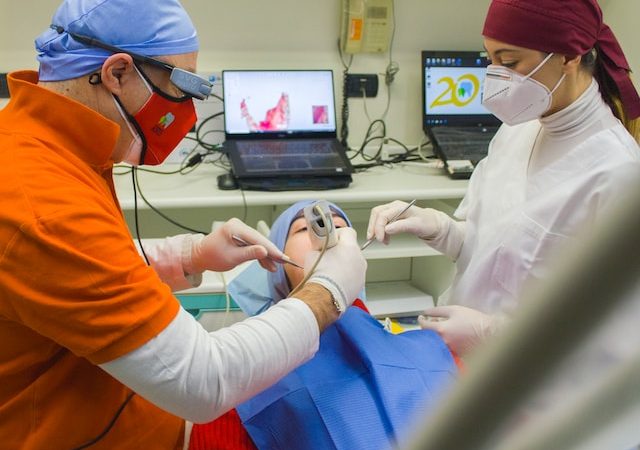Timing plays a crucial role in maintaining a brighter smile. Knowing when to brush and floss can enhance the effectiveness of your oral hygiene routine. Here’s a breakdown of the best timing for brushing and flossing: Brushing: Morning brushing: It’s important to brush your teeth in the morning to remove plaque and bacteria that have
Timing plays a crucial role in maintaining a brighter smile. Knowing when to brush and floss can enhance the effectiveness of your oral hygiene routine. Here’s a breakdown of the best timing for brushing and flossing:
- Brushing:
- Morning brushing: It’s important to brush your teeth in the morning to remove plaque and bacteria that have accumulated overnight. Brushing upon waking up helps freshen your breath and prepares your teeth for the day.
- Wait after breakfast: If you consume acidic foods or beverages for breakfast, such as citrus fruits or fruit juices, it’s advisable to wait at least 30 minutes before brushing your teeth. Acidic substances can temporarily soften the tooth enamel, and brushing immediately afterward can lead to enamel erosion. Waiting allows the saliva to naturally neutralize the acids and remineralize the enamel.
- Before bedtime brushing: Brushing before bed is essential as it removes food particles, plaque, and bacteria that have built up throughout the day. This practice helps prevent cavities, gum disease, and bad breath while you sleep.
- Flossing:
- Floss once a day: Flossing should ideally be done at least once a day. The timing can vary based on personal preference, but many dentists recommend flossing before bedtime. Flossing before brushing allows the toothbrush and fluoride toothpaste to reach more areas between the teeth and along the gumline, as the floss removes debris and plaque.
- Floss after meals, if needed: If you frequently get food particles stuck between your teeth after meals, it’s beneficial to floss after eating. This practice helps dislodge the trapped food, preventing bacterial growth, gum inflammation, and decay.
- Additional considerations:
- Rinse after meals: After meals, rinsing your mouth with water can help remove food particles and reduce the acidity in your mouth. Swish water around thoroughly and spit it out.
- Use mouthwash, if advised: Some mouthwashes can enhance oral hygiene by killing bacteria and freshening breath. If recommended by your dentist, follow the instructions provided and use it at a separate time from brushing, such as after meals or at a different time of day.
- Regular dental check-ups: In addition to proper timing for brushing and flossing, don’t forget to schedule regular dental check-ups. Professional cleanings and exams are essential for maintaining a bright smile. Your dentist can identify any potential issues early on and provide personalized advice for your oral hygiene routine.
Remember, consistency is key for maintaining a brighter smile. Establish a routine that includes brushing at least twice a day, flossing daily, rinsing after meals, and scheduling regular dental visits. By understanding the importance of timing and following proper techniques, you can optimize your oral hygiene routine and contribute to a brighter, healthier smile.
Proper timing is essential for maximizing the effectiveness of your dental routine and promoting healthy teeth. By understanding the significance of timing, you can enhance your oral hygiene habits and achieve a happier, healthier smile. Here’s how proper timing can boost your dental routine:
- Brushing:
- Morning brushing: Brush your teeth in the morning to eliminate overnight plaque and bacteria buildup. This freshens your breath and prepares your teeth for the day ahead.
- Wait after meals: If you consume acidic foods or drinks, it’s crucial to wait at least 30 minutes before brushing your teeth. Acidic substances can temporarily weaken the enamel, and immediate brushing can lead to enamel erosion. Waiting allows the saliva to neutralize the acids and protect the enamel.
- Before bedtime brushing: Brushing before bed is vital as it removes food particles, plaque, and bacteria that accumulate during the day. This practice helps prevent cavities, gum disease, and bad breath while you sleep.
- Flossing:
- Daily flossing: Flossing should be done at least once a day to remove plaque and food particles between teeth. The timing can vary, but many people find it beneficial to floss before bedtime. Flossing before brushing allows the toothbrush and toothpaste to reach more areas between the teeth and along the gumline, as the floss removes debris.
- Floss after meals, if necessary: If you tend to have food particles stuck between your teeth after meals, consider flossing after eating. This helps dislodge the trapped food and prevents bacterial growth, gum inflammation, and decay.
- Rinse and gargle:
- Rinse after meals: After meals, rinse your mouth with water to remove food particles and reduce the acidity. Swish water around thoroughly and spit it out.
- Use mouthwash, if recommended: Mouthwash can provide additional benefits, such as killing bacteria and freshening breath. If advised by your dentist, use an antimicrobial mouthwash. Follow the instructions on the bottle and incorporate it into your routine at a separate time from brushing and flossing.
- Regular dental check-ups:
- Schedule dental visits: Regular dental check-ups are crucial for maintaining oral health. Visit your dentist as recommended, usually every six months, or according to their advice. Professional cleanings, examinations, and any necessary treatments can be performed during these visits.
By following proper timing in your dental routine, you can optimize your oral health and contribute to a happier smile. Additionally, practice good oral hygiene habits daily, such as brushing at least twice a day, flossing daily, and maintaining a balanced diet. Don’t forget to replace your toothbrush regularly and use a toothpaste and dental floss that are recommended by your dentist. With consistency and proper timing, you can establish healthy habits and enjoy the benefits of a happy, confident smile.

















Leave a Comment
Your email address will not be published. Required fields are marked with *